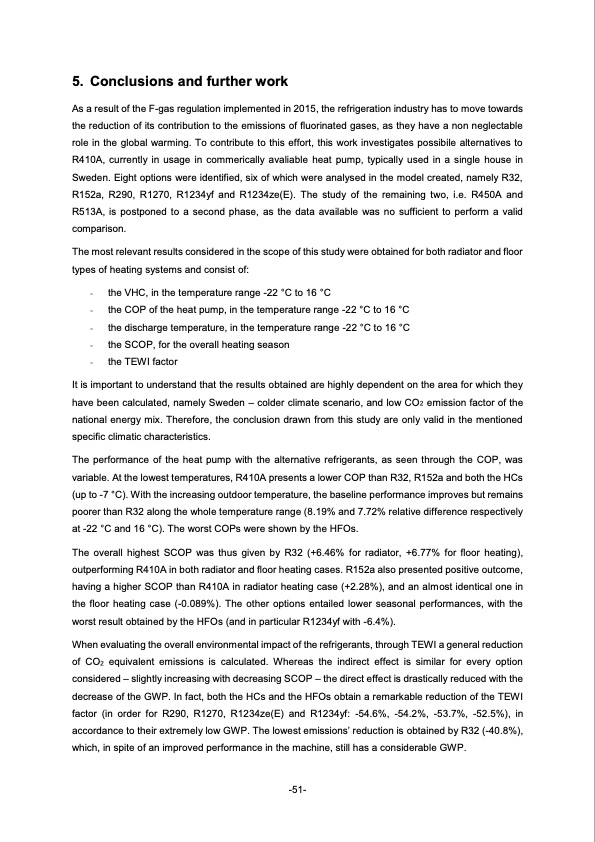
PDF Publication Title:
Text from PDF Page: 060
5. Conclusions and further work As a result of the F-gas regulation implemented in 2015, the refrigeration industry has to move towards the reduction of its contribution to the emissions of fluorinated gases, as they have a non neglectable role in the global warming. To contribute to this effort, this work investigates possibile alternatives to R410A, currently in usage in commerically avaliable heat pump, typically used in a single house in Sweden. Eight options were identified, six of which were analysed in the model created, namely R32, R152a, R290, R1270, R1234yf and R1234ze(E). The study of the remaining two, i.e. R450A and R513A, is postponed to a second phase, as the data available was no sufficient to perform a valid comparison. The most relevant results considered in the scope of this study were obtained for both radiator and floor types of heating systems and consist of: - the VHC, in the temperature range -22 °C to 16 °C - the COP of the heat pump, in the temperature range -22 °C to 16 °C - the discharge temperature, in the temperature range -22 °C to 16 °C - the SCOP, for the overall heating season - the TEWI factor It is important to understand that the results obtained are highly dependent on the area for which they have been calculated, namely Sweden – colder climate scenario, and low CO2 emission factor of the national energy mix. Therefore, the conclusion drawn from this study are only valid in the mentioned specific climatic characteristics. The performance of the heat pump with the alternative refrigerants, as seen through the COP, was variable. At the lowest temperatures, R410A presents a lower COP than R32, R152a and both the HCs (up to -7 °C). With the increasing outdoor temperature, the baseline performance improves but remains poorer than R32 along the whole temperature range (8.19% and 7.72% relative difference respectively at -22 °C and 16 °C). The worst COPs were shown by the HFOs. The overall highest SCOP was thus given by R32 (+6.46% for radiator, +6.77% for floor heating), outperforming R410A in both radiator and floor heating cases. R152a also presented positive outcome, having a higher SCOP than R410A in radiator heating case (+2.28%), and an almost identical one in the floor heating case (-0.089%). The other options entailed lower seasonal performances, with the worst result obtained by the HFOs (and in particular R1234yf with -6.4%). When evaluating the overall environmental impact of the refrigerants, through TEWI a general reduction of CO2 equivalent emissions is calculated. Whereas the indirect effect is similar for every option considered – slightly increasing with decreasing SCOP – the direct effect is drastically reduced with the decrease of the GWP. In fact, both the HCs and the HFOs obtain a remarkable reduction of the TEWI factor (in order for R290, R1270, R1234ze(E) and R1234yf: -54.6%, -54.2%, -53.7%, -52.5%), in accordance to their extremely low GWP. The lowest emissions’ reduction is obtained by R32 (-40.8%), which, in spite of an improved performance in the machine, still has a considerable GWP. -51-PDF Image | Next generation of refrigerants for residential heat pump systems

PDF Search Title:
Next generation of refrigerants for residential heat pump systemsOriginal File Name Searched:
MartinaLonghini_ThesisReport.pdfDIY PDF Search: Google It | Yahoo | Bing
CO2 Organic Rankine Cycle Experimenter Platform The supercritical CO2 phase change system is both a heat pump and organic rankine cycle which can be used for those purposes and as a supercritical extractor for advanced subcritical and supercritical extraction technology. Uses include producing nanoparticles, precious metal CO2 extraction, lithium battery recycling, and other applications... More Info
Heat Pumps CO2 ORC Heat Pump System Platform More Info
| CONTACT TEL: 608-238-6001 Email: greg@infinityturbine.com | RSS | AMP |